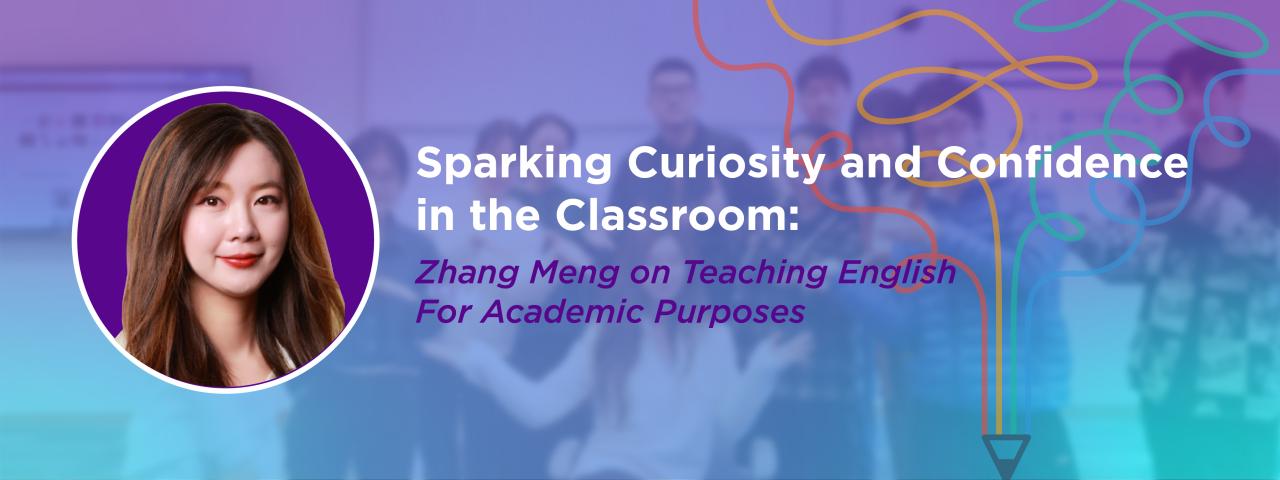
For over three years now, Clinical Assistant Professor Zhang Meng has been using subjects that inspire and intrigue her—from fashion consciousness, to smart cities, to space exploration—as a way to foster curiosity and collaboration among her students. Zhang teaches English for Academic Purposes (EAP), a core curriculum course at NYU Shanghai designed to help first-year students grow into more confident and capable academics.
Recently the NYU Shanghai Library interviewed Zhang. Listen to a 5-minute clip from the podcast below.
What is your teaching philosophy?
My overall philosophy has been to really get students accustomed to the participation structure of the Western classroom. I need to help my students socialize into the university setting and connect and collaborate with their peers and also with faculty. I am also trying to help students build up connections. For example, I invite experts from the library every semester to give a workshop. One purpose is to familiarize students with academic resources, but it’s also so that they know that they can reach out for help from that particular expert. Besides socialization, I am trying to help my students become confident second language speakers through a rich array of classroom and research practices. It is from these practices that they develop a more creative, critical, and forward thinking.
What inspired your most recent EAP course theme of space exploration?
When I proposed this course–EAP: Gaze into Space–over the summer, I’d been reading a bunch of books and watching TV shows and news reports related to human expeditions to space exploration, including one particular volume focused on the Apollo missions. The more I read, the more I became curious about space, the galaxies, the cosmos, the universe. I then transformed the subject into a systematic course–something teachable and deliverable to students that would guide them towards building up a kind of multi-disciplinary, creative mind with critical thinking patterns. This semester, we covered the history of space exploration instruments, some of the challenges, and specific space projects. We also talked a bit about astrophysics [and] theoretical physics. My hope is to expose students to interesting and also avant-garde topics.
What challenges do students face coming in? What skills are you helping them develop?
As an academic English course, we incorporate and teach solid skills like speaking, presenting and listening in a university setting. We also teach writing skills and reading strategies, as well as skills for conducting entry-level research.
For Chinese students in particular, who come from middle school and high school environments with big class sizes, there’s usually very little chance for them to participate in small group work. When I ask them to work with their neighbors sitting next to them or assign them to small groups, I can tell they feel really nervous at first. They might not know how to start the conversation, or maybe they’re afraid of making mistakes, especially since they need to speak in English as a second language, and academically!
From a micro perspective, the skills relevant to participating in discussions that are taught and practiced in class include, for example, initiating, maintaining, and facilitating discussion and also gaining and holding the floor throughout a seminar event. From a macro perspective, students are engaged in practices on the logic of movements in participating in discussions/seminars. The idea of working with evidence has been reinforced.
Has your own college experience informed your pedagogy?
I studied in the US for college and had no idea how to approach small group work; it was super hard for me, leaving me stressed out and overwhelmed every day. I wish someone could have told me, “This is a safe space, and you can practice, and you don't have to fear making mistakes.”
I think of the small group as a kind of rehearsal space for peer scaffolding where students can engage with peers on issues that they're not confident about by sharing and testing thoughts, asking questions, and helping each other. To encourage them to talk, I give them a set of guided questions to help them understand where to start. From there, they invite group members to talk and gradually build upon each other's voices and resources. I hope they get familiar with the process of moving from a smaller, safer space into a bigger space.
What’s your advice to first-year students?
Start building connections. Not only from the academic perspective but also from a social, networking perspective. Check in with each other for emotional support to survive the first semester–even the first year! Talk to your professors, instructors, and advisors for feedback on your progress.
What do you value about teaching at NYU Shanghai?
NYU Shanghai is home to me–a home that gives me so much care and support. I think the greatest thing that I’ve experienced here is the level of flexibility faculty in the EAP program have to explore our own interests and then transform those interests into a solid syllabus. We’ve taught on themes that range from the humanities to hard sciences, and my colleagues have given me a lot of good feedback on my course design, providing me with suggestions for class activities. We are also encouraged to connect with external institutions or universities. I invited an astrophysicist from Jiao Tong University as a guest speaker this semester to talk about dark energy and dark matter. I love that the school gives my students more opportunities to connect with real experts in the field.

